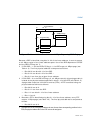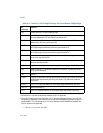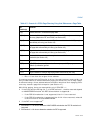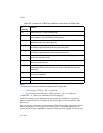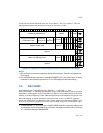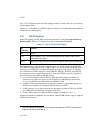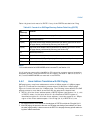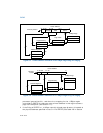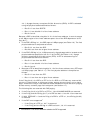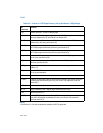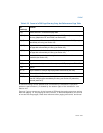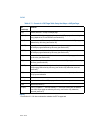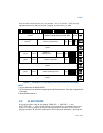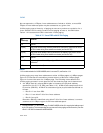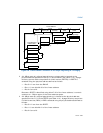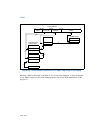
Vol. 3 4-19
PAGING
4.4.1) A page directory comprises 512 64-bit entries (PDEs). A PDE is selected
using the physical address defined as follows:
— Bits 51:12 are from PDPTEi.
— Bits 11:3 are bits 29:21 of the linear address.
— Bits 2:0 are 0.
Because a PDE is identified using bits 31:21 of the linear address, it controls access
to a 2-Mbyte region of the linear-address space. Use of the PDE depends on its PS
flag (bit 7):
• If the PDE’s PS flag is 1, the PDE maps a 2-MByte page (see Table 4-9). The final
physical address is computed as follows:
— Bits 51:21 are from the PDE.
— Bits 20:0 are from the original linear address.
• If the PDE’s PS flag is 0, a 4-KByte naturally aligned page table is located at the
physical address specified in bits 51:12 of the PDE (see Table 4-10). A page
directory comprises 512 64-bit entries (PTEs). A PTE is selected using the
physical address defined as follows:
— Bits 51:12 are from the PDE.
— Bits 11:3 are bits 20:12 of the linear address.
— Bits 2:0 are 0.
• Because a PTE is identified using bits 31:12 of the linear address, every PTE maps
a 4-KByte page (see Table 4-11). The final physical address is computed as
follows:
— Bits 51:12 are from the PTE.
— Bits 11:0 are from the original linear address.
If the P flag (bit 0) of a PDE or a PTE is 0 or if a PDE or a PTE sets any reserved bit,
the entry is used neither to reference another paging-structure entry nor to map a
page. A reference using a linear address whose translation would use such a paging-
structure entry causes a page-fault exception (see Section 4.7).
The following bits are reserved with PAE paging:
• If the P flag (bit 0) of a PDE or a PTE is 1, bits 62:MAXPHYADDR are reserved.
• If the P flag and the PS flag (bit 7) of a PDE are both 1, bits 20:13 are reserved.
• If IA32_EFER.NXE = 0 and the P flag of a PDE or a PTE is 1, the XD flag (bit 63)
is reserved.
• If the PAT is not supported:
1
— If the P flag of a PTE is 1, bit 7 is reserved.
— If the P flag and the PS flag of a PDE are both 1, bit 12 is reserved.
1. See Section 4.1.4 for how to determine whether the PAT is supported.



